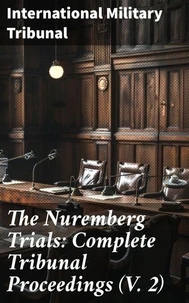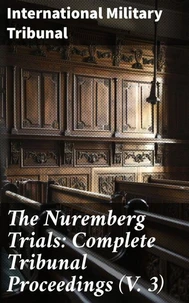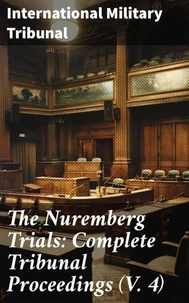The Nuremberg Trials (Vol.8)
Par :Formats :
Disponible dans votre compte client Decitre ou Furet du Nord dès validation de votre commande. Le format ePub est :
- Compatible avec une lecture sur My Vivlio (smartphone, tablette, ordinateur)
- Compatible avec une lecture sur liseuses Vivlio
- Pour les liseuses autres que Vivlio, vous devez utiliser le logiciel Adobe Digital Edition. Non compatible avec la lecture sur les liseuses Kindle, Remarkable et Sony
 , qui est-ce ?
, qui est-ce ?Notre partenaire de plateforme de lecture numérique où vous retrouverez l'ensemble de vos ebooks gratuitement
Pour en savoir plus sur nos ebooks, consultez notre aide en ligne ici
- Nombre de pages569
- FormatePub
- ISBN406-4-06-638119-6
- EAN4064066381196
- Date de parution07/05/2021
- Protection num.Digital Watermarking
- Taille702 Ko
- Infos supplémentairesepub
- ÉditeurMUSAICUM BOOKS
Résumé
The Nuremberg Trials (Vol.8) by the International Military Tribunal is a comprehensive account of one of the most significant trials in history. The book delves into the legal proceedings that took place after World War II to bring Nazi war criminals to justice. The writing is factual and objective, presenting the evidence and testimonies in a clear and concise manner. The literary style is reminiscent of a legal document, reflecting the seriousness of the subject matter.
The context of the book is crucial in understanding the post-war attempts to establish accountability and prevent future atrocities. The Nuremberg Trials serve as a landmark in international law and set a precedent for prosecuting crimes against humanity. The International Military Tribunal, comprised of Allied powers, embarked on the monumental task of holding individuals accountable for the atrocities committed during the war.
The author's background in military and legal fields likely influenced the writing of this book, contributing to its authoritative tone and meticulous attention to detail. The Nuremberg Trials shed light on the importance of upholding justice and confronting the horrors of the past. I highly recommend The Nuremberg Trials (Vol.8) to readers interested in legal history, international relations, and human rights.
This book offers valuable insights into the complexities of prosecuting war crimes and the challenges of achieving justice in the aftermath of conflict. It is a compelling and necessary read for anyone seeking to understand the principles of accountability and the impact of the Nuremberg Trials on contemporary international law.
The context of the book is crucial in understanding the post-war attempts to establish accountability and prevent future atrocities. The Nuremberg Trials serve as a landmark in international law and set a precedent for prosecuting crimes against humanity. The International Military Tribunal, comprised of Allied powers, embarked on the monumental task of holding individuals accountable for the atrocities committed during the war.
The author's background in military and legal fields likely influenced the writing of this book, contributing to its authoritative tone and meticulous attention to detail. The Nuremberg Trials shed light on the importance of upholding justice and confronting the horrors of the past. I highly recommend The Nuremberg Trials (Vol.8) to readers interested in legal history, international relations, and human rights.
This book offers valuable insights into the complexities of prosecuting war crimes and the challenges of achieving justice in the aftermath of conflict. It is a compelling and necessary read for anyone seeking to understand the principles of accountability and the impact of the Nuremberg Trials on contemporary international law.
The Nuremberg Trials (Vol.8) by the International Military Tribunal is a comprehensive account of one of the most significant trials in history. The book delves into the legal proceedings that took place after World War II to bring Nazi war criminals to justice. The writing is factual and objective, presenting the evidence and testimonies in a clear and concise manner. The literary style is reminiscent of a legal document, reflecting the seriousness of the subject matter.
The context of the book is crucial in understanding the post-war attempts to establish accountability and prevent future atrocities. The Nuremberg Trials serve as a landmark in international law and set a precedent for prosecuting crimes against humanity. The International Military Tribunal, comprised of Allied powers, embarked on the monumental task of holding individuals accountable for the atrocities committed during the war.
The author's background in military and legal fields likely influenced the writing of this book, contributing to its authoritative tone and meticulous attention to detail. The Nuremberg Trials shed light on the importance of upholding justice and confronting the horrors of the past. I highly recommend The Nuremberg Trials (Vol.8) to readers interested in legal history, international relations, and human rights.
This book offers valuable insights into the complexities of prosecuting war crimes and the challenges of achieving justice in the aftermath of conflict. It is a compelling and necessary read for anyone seeking to understand the principles of accountability and the impact of the Nuremberg Trials on contemporary international law.
The context of the book is crucial in understanding the post-war attempts to establish accountability and prevent future atrocities. The Nuremberg Trials serve as a landmark in international law and set a precedent for prosecuting crimes against humanity. The International Military Tribunal, comprised of Allied powers, embarked on the monumental task of holding individuals accountable for the atrocities committed during the war.
The author's background in military and legal fields likely influenced the writing of this book, contributing to its authoritative tone and meticulous attention to detail. The Nuremberg Trials shed light on the importance of upholding justice and confronting the horrors of the past. I highly recommend The Nuremberg Trials (Vol.8) to readers interested in legal history, international relations, and human rights.
This book offers valuable insights into the complexities of prosecuting war crimes and the challenges of achieving justice in the aftermath of conflict. It is a compelling and necessary read for anyone seeking to understand the principles of accountability and the impact of the Nuremberg Trials on contemporary international law.





